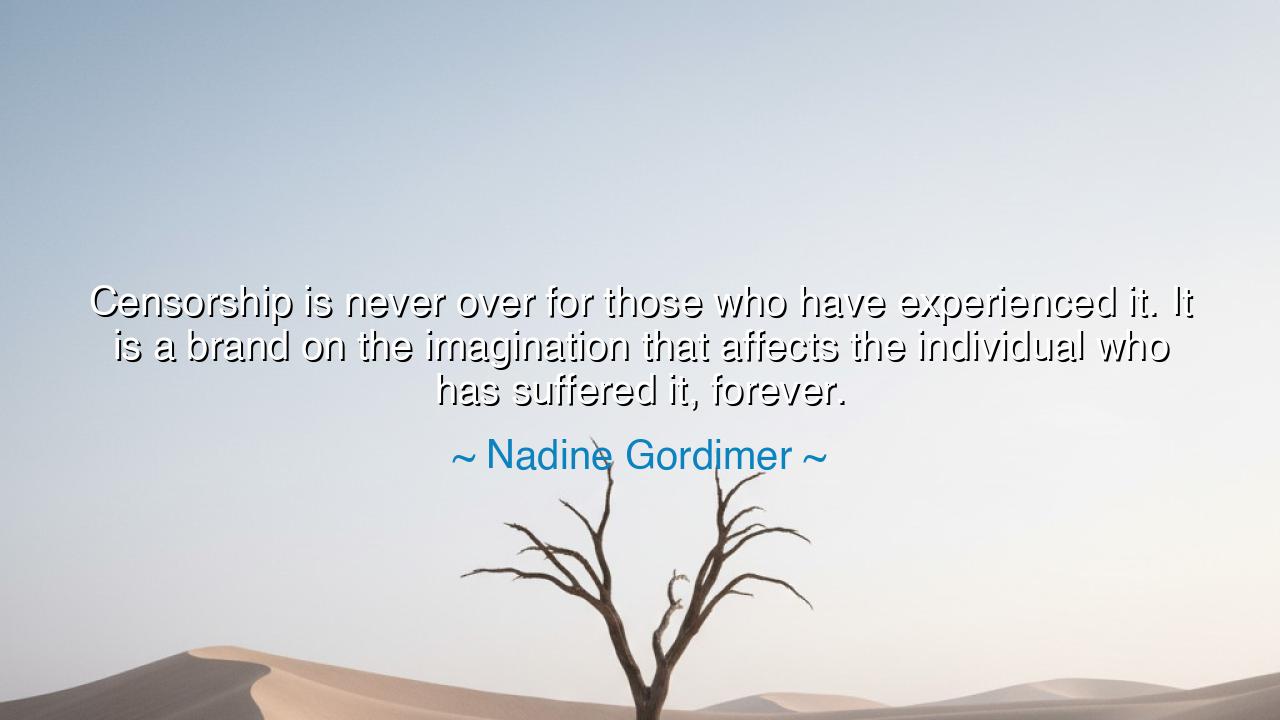
Censorship is never over for those who have experienced it. It is
Censorship is never over for those who have experienced it. It is a brand on the imagination that affects the individual who has suffered it, forever.






The words of Nadine Gordimer — “Censorship is never over for those who have experienced it. It is a brand on the imagination that affects the individual who has suffered it, forever.” — rise from the depths of human struggle, burning like an ember that refuses to fade. Gordimer, who lived through the dark years of apartheid in South Africa, knew that censorship is not merely a political act but a wound upon the soul. It does not end when the law is repealed or the tyrant falls; it leaves its mark, invisible yet enduring, upon the imagination itself — the sacred space where freedom first begins.
In ancient times, the sages said that the word was divine — that speech and thought were the instruments of creation. To silence a person, therefore, is to strike at the very source of their being. Censorship is not only the suppression of voices; it is the branding of the imagination, the scarring of the inner eye that dreams, questions, and dares. When the mind learns that certain thoughts are forbidden, it begins to chain itself even after the jailer has gone. This is why Gordimer speaks of the scar that lasts forever — for once imagination has been burned, it learns fear, and that fear becomes a shadow within creation itself.
Gordimer’s own life is testimony to this truth. Under apartheid, her novels — rich with truth and defiance — were often banned. She lived in a land where words were policed, where truth was treason, and where even the imagination could be accused of rebellion. Yet she continued to write. But even she admitted that the memory of censorship lingers — not in the ink, but in the blood. The artist who has been silenced once must forever wrestle with the ghost of that silence. Each word becomes a choice between courage and caution. Even freedom, once regained, tastes of vigilance.
This is not new to her time alone. Recall the story of Galileo Galilei, who gazed through his telescope and saw the heavens as they truly are — yet was condemned by the guardians of dogma. Forced to recant, he lived the rest of his life under house arrest, his truth bound though his mind remained free. Though the stars still shone above him, a deeper prison had been built within — the brand of censorship, the knowledge that one’s thoughts may cost one’s peace. His whisper, “And yet it moves,” is not just defiance but a cry from the branded soul — one who has seen truth and felt the price of speaking it.
For censorship is not content with silencing the tongue; it seeks to colonize the mind. It teaches the dreamer to doubt the legitimacy of his own vision. It teaches the artist to self-censor, to polish away the dangerous edges of truth until only safe illusions remain. It breeds a quiet compliance, a subtle fear that turns creation into imitation. And so, even when the external bars are lifted, the inner ones remain. The imagination, once taught to bow, must learn again how to stand upright.
Yet even in this tragedy, there is hope. The brand of censorship, though it wounds, can also awaken resistance. Those who have felt the fire may become its opposite — the torchbearers who refuse to let silence rule again. Gordimer herself turned her pain into strength, writing not out of comfort but out of necessity. In every nation and every era, the ones who have known the darkness of suppression often become the fiercest defenders of light. Their suffering gives birth to wisdom; their scars become maps for others seeking freedom.
Let this, then, be the lesson for all who hear: guard your freedom of thought as you would guard your breath. Do not allow fear, fashion, or authority to dictate what you may imagine. Question even the truths that comfort you, for stagnation is the gentlest form of censorship. And if you live in freedom, use that freedom to protect the voices still silenced. Read what is forbidden. Speak what is necessary. Create what is true.
For as the ancients would teach — the imagination is the temple of the human spirit. To brand it is to desecrate the divine. Therefore, honor it. Defend it. And remember always that the battle for freedom is not fought once in the world — it is fought endlessly within the mind.






AAdministratorAdministrator
Welcome, honored guests. Please leave a comment, we will respond soon